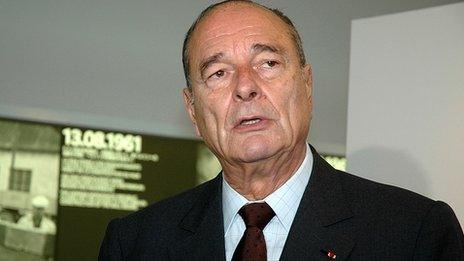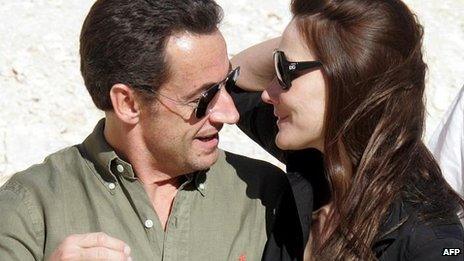'Affair' story will continue to rumble
- Published
Francois Hollande: "Private matters should be dealt with privately"
There was a sense of the inevitable about the news conference on 14 January. No surprise that the alleged "affair" was the topic of the first question - and a carefully posed question at that - from a member of the presidential press corps. It was dealt with swiftly.
That only one question would suffice speaks of the enormous cultural difference between the British and French media.
Can you envisage how such a story might be covered in Britain if David Cameron were caught in similar circumstances?
But then there is valid reason why President Francois Hollande is shown this deference.
He is the head of state, the figurehead of the nation, and in office he will always be afforded a greater level of respect by the French media.
And then of course Mr Hollande is not the worst offender.
Every president to have held power in France since 1974 has been rumoured to have cheated on their wives. Jacques Chirac came closest to making a public admission of guilt. "There have been women I have loved," he said. "A lot, as discreetly as possible."
When the newspaper Paris-Match obtained images of Mazarine Pingeot, the daughter whom President Mitterrand had conceived with his lover Anne Pingeot, they sought the president's permission before publishing them.
Things changed with the arrival of President Sarkozy - perhaps also with the advent of Twitter.

Jacques Chirac said he had loved "a lot" of women
These days rumours circulate more freely. Besides, Mr Sarkozy was never so presidential, said his critics. His personal life, even his romantic life, was central to his new brand of leadership. The French electors were invited to share his personal misfortunes and his joy - his divorce from Cecilia; his quick courtship and marriage to Carla Bruni; the birth of their daughter, Giulia.
Increasingly, the boundaries between the private and the public have become blurred.
No wonder the establishment shuddered at the revelations of the past week, though there is an entirely legitimate, pertinent question about the way in which Mr Hollande is said to have travelled to these night-time liaisons.
We don't know how many "stolen nights" there were but on each occasion he travelled - albeit 150 yards - on a moped, trailed by the paparazzi. "On one occasion he was walking around the block," said the photographer who allegedly caught him in the act.
It is not the women the president chooses, that is the subject for debate here. It's his judgement. The unnecessary risks he took, say the newspapers, at a time when France faces a heightened terrorist threat.
"No reason to worry," said the president today. "I was perfectly safe."

Nicolas Sarkozy's romance with ex-model Carla Bruni grabbed the headlines when he became president
Which leaves the issue of the first lady. There will of course have to be further clarification - and soon - on any future role Valerie Trierweiler will play. There is the pressing nature of a trip to the United States in February, though it would seem highly unlikely she will now be on that trip.
The president hasn't given much away today but he has pointed the public to the "difficult situation" in his private life.
No question there's a problem. The Elysee may be working to draw a line under the affair, but I'd guess that while Ms Trierweiler remains out of view, the story will surely continue to rumble. The less charitable commentators suggest she knows it.
Frederic Gerschel, a journalist from the newspaper Le Parisien, confirmed yesterday that he spoke to the First Lady on Sunday evening. If she is briefing journalists on the state of her health, then it suggests she wants to control some aspect of the media coverage.
For the Elysee it will require some careful handling. A deeply unpopular president can ill afford any further criticism.
- Published14 January 2014
- Published14 January 2014
- Published13 January 2014
- Published13 January 2014